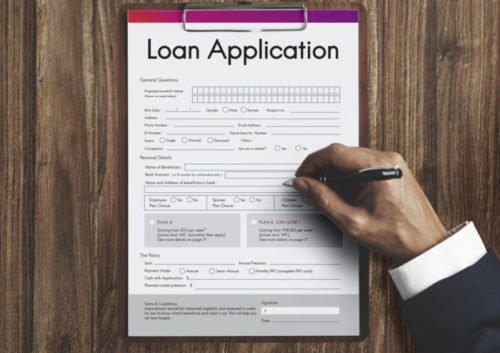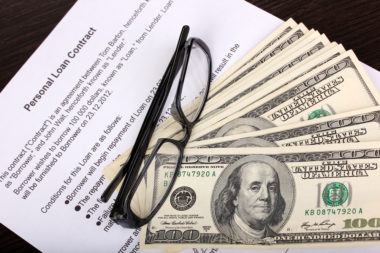If you plan on applying for a personal loan, you are going to need to get prepared by gathering some important personal and financial documentation. The lender will also need access to your credit score and credit history to decide if you meet the requirements to be approved for a personal loan.
Table of Contents
Get Your Credit Score
Your ability to qualify for a personal loan or a loan with a low interest rate will hinge on your credit score. A good or excellent credit score will give you a better chance at qualifying for a loan with a great interest rate. A fair credit score may still secure you the loan, but your interest rates will be higher. If you have a bad credit score you may be unable to get a personal loan until you build up and repair your credit.
Your credit score will fall into one of the following ranges:
- Excellent credit: 750 and higher.
- Good credit: 750 to 690.
- Average or fair credit: 590 to 690.
- Bad credit: 300 to 590.
You should check your credit score before you speak with a lender or apply for a loan. If you know your credit score before you apply, you may be able to decide whether pursuing a loan is the right choice to make at the time.
Additionally, sharing your credit score with the lender before going through the whole application process may help the lender tell you whether you will qualify before pursuing the application process and performing any hard checks on your credit.
Even if you know your credit score, the lender will still perform a hard credit check during your application process to document your credit score and review your credit history. A hard check will harm your credit for a short while, so if you would like to avoid this, and simply find out whether you can get a loan, you should consider becoming prequalified.
Prequalifying for a Personal Loan
To prequalify you for a loan, the lender will often perform a soft credit check which will not affect your credit score. Prequalifying for loans may provide you with the opportunity to shop around with different lenders for the best interest rate. The pre-qualification process will require some of your personal information. This may include:
- Your Social Security number and date of birth.
- Proof of income and your employer’s information.
- Your debt-to-income ratio.
- Your address and contact information.
- Your addresses for the last few years.
- Your mother’s maiden name.
- Your status as a student; the name of your college and your major.
You may not prequalify for a loan if:
- You have too little income.
- You do not have enough work history.
- Your credit score is too low.
- You have too high of a debt-to-income ratio.
- You have too many recent credit checks and inquiries.
Gather Your Personal Documentation
When you apply for a personal loan, the bank or lender will need some personal information provided through proper documentation.
Proof of Identity
Your lender may require some basic information about you. You may need proof that you are a U.S. citizen, or that you have permanent residency, or a long-term visa. You will also need a verifiable bank account and you must be 18 years of age or older. Common documents used for proof of identity include:
- A state or government-issued ID, military ID, or driver’s license.
- A birth certificate.
- A Social Security card.
- A passport.
- A certificate of citizenship.
Proof of Address
Lenders must verify where you live. Some smaller personal loan lenders may also ask how long you have been at your current place and if you rent or own your home. Living in the same residence for a few consecutive years showcases your financial stability and might increase your chances of being approved.
Documents that prove your address include:
- Utility bills or insurance documents for your car or home.
- Lease or rental agreements.
- Proof of insurance for your home or vehicle.
- Voter registration documents.
- Change of address or address confirmation documents from the US Postal Service.
Proof of Income
To ensure that you have the financial stability to make monthly payments and pay back the loan if approved, the lender may ask for proof of income. The lender may also request proof of income for the last few years to evaluate your financial stability. If you are an employee, the acceptable documents for proof of income include:
- Bank statements.
- Pay stubs.
- W-2 tax forms.
- Copies of income tax returns.
- Contact information for verification from your employer.
If you are self-employed, you may provide:
- Bank statements.
- 1099 tax forms.
- Copies of income tax returns.
Additionally, the lender will ask for information on other expenses and your debt-to-income ratio to ensure you have enough cash flow to make your monthly loan payment. Debts your lender may inquire about include:
- Mortgage loans and rent payments.
- Car loans and payments.
- Student loans and payments.
- Credit cards and payments.
If you are not approved for a loan because of your debt-to-income ratio, you can ask a trusted friend or family member who has good credit and income to be a cosigner to help you qualify for a personal loan.
Complete an Application
Although they will be generally similar, chances are each lender will have a unique loan application and application process. The application will ask for general and basic personal information; you will also need to indicate the desired loan amount, as well as the reason or purpose for the loan. The lender may perform a hard check on your credit after they have received your application.
Additional Things You Need to Know to Get a Loan
Aside from meeting loan requirements and gathering and providing the necessary documentation, there are a few things you must consider before getting a loan.
Know How Much You Need to Borrow
When you apply for your loan, you will need to know how much you need to borrow. You may also need to provide an explanation as well as any important details concerning your use of the loan.
The lender will be able to discuss the loan amount you qualify for, the length and term of the loan, as well as your best borrowing options. If possible, it’s best to take a loan in the smallest amount you need. The interest rates will figure into the total amount you pay for the loan, so if you borrow more than you need, you may be paying extra interest.
Know Where You Want to Get a Loan From
There are a few options available to you to choose from when applying for a personal loan. You may choose from:
- Small and local or large banks.
- Credit unions.
- Non-banking financial institutions such as brick-and-mortar finance companies, insurance companies, peer-to-peer lenders, and other non-bank entities.
If you are prequalified, you can also shop around for the best option when choosing where to get your loan. This means you can see the details of the loan from different loan sources and consider the loan amount they are willing to offer, the amount your monthly payment will be, as well as the different interest rates offered by different loan providers.
Know Your Rights
The Consumer Financial Protection Bureau regulates protections for consumers making financial transactions, including personal loans. The Truth in Lending Act provides a uniform system of disclosure that protects consumers. The Act ensures that lenders provide accurate information and it sets restrictions, limitations, and standards that lenders must uphold.
Know the Details of the Loan
When applying for a loan you will need to ask the lender some important questions that help you understand what you are signing up for. To get a personal loan, you will need to understand:
- Important loan details such as the total loan amount you will receive and the term of the loan.
- The loan APR and interest as well as the type of interest, whether it is fixed variable, precomputed, or simple interest.
- You should also find out if there are any other fees or penalties you should be aware of.
- Most personal loans are unsecured, but you will need to know whether your loan is secured or unsecured.
- You may also ask about payment features. These may include prepayment penalties, automatic withdrawals or flexible payment features, if on-time payments are reported to credit bureaus, and if the lender makes direct payment to your creditors.
Image Source: https://depositphotos.com/





